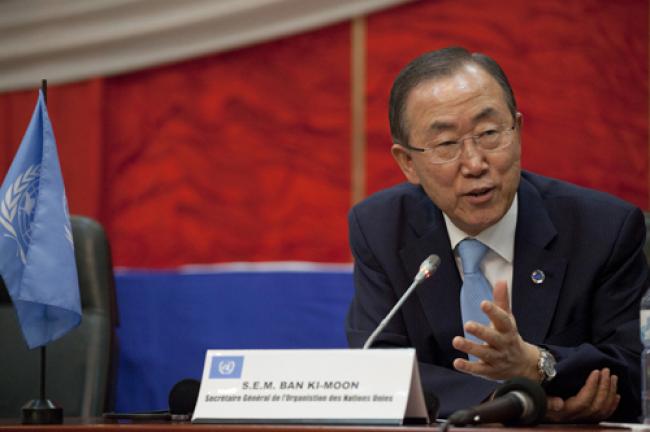08 Nov 2013, 08:16 am Print

“Extreme weather patterns have shown that climate change is fast approaching – much, much faster than one may expect,” Ban said ahead of his meeting with Prime Minister Luc-Adolphe Tiao.
“The developed world – they have capacity, they have means, they have money to handle this – but you do not,” he stressed, adding that it is only natural that developed nations provide the necessary funding and technology to address this impact.
Praising the Government of President Blaise Compaoré and Prime Minister Tiao, Ban appealed to the leaders to “to speak out and work together with the United Nations.”
Noting that the country is among those “most impacted” by the changing weather patterns, Ban also urged a push for the African Union (AU) to champion this cause, “If you are not speaking up, then who will.”
Turning to the two other priorities for the UN and the international community to work on together, Ban stressed achieving the anti-poverty targets known as the Millennium Development Goals (MDGS) by their 2015 deadline and defining the sustainable development goals which will follow.
The UN Member States have identified 26 such challenges starting with climate change, water scarcity, agricultural problems, energy shortages, gender empowerment, education, urbanization, transportation, and nutrition issues.
“From 2016 to 2030, we have to have a blue print as our leaders will gather at the United Nations in 2015,” Ban said.
The UN chief, who is on a multi-stop tour of the Sahel along with World Bank Group President Jim Yong Kim and other senior development officials, also reiterated the organizations’ solidarity with the people of the region.
“The region has suffered too much and for too long,” he said. “We are here to listen and especially to act. Our message is clear: peace and development must go hand in hand.”
Ban and Kim head next to N’djamena, Chad. Their earlier stops were in Mali and Niger.
The Sahel has suffered three major droughts in less than a decade. More than 11 million people are at risk of hunger and 5 million children under five are at risk of acute malnutrition. In addition, political instability and unconstitutional changes in Governments have had significant economic and social consequences in the region and terrorist acts, as well as organized crime, have threatened the region’s stability.
Secretary-General Ban Ki-moon talks with government ministers of Burkina Faso in the capital Ouagadougou. Photo: World Bank/Dominic Chavez
- Twice the heat, twice the danger! Arab region faces explosive climate threat, warns UN
- When finance flows, ambition grows: The critical COP30 message the world can’t ignore
- Breathing polluted air causes more than 4.5 million premature deaths every year, say UN climate experts
- Earth's average temperature in next five years may breach 1.5 °C limit: UN report
- Antonio Guterres urges immediate action to tackle rapid Himalayan glacier melt



-1763561110.jpg)


